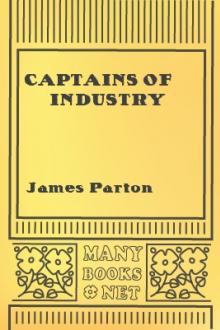Captains of Industry - James Parton (the false prince txt) 📗

- Author: James Parton
- Performer: -
Book online «Captains of Industry - James Parton (the false prince txt) 📗». Author James Parton
It seems strange that people in a Christian country could have had a good steady boy like this in their house and yet do nothing to cheer or comfort his life. Old men tell me it was a very common case in New England seventy years ago.
This hard experience on the farm lasted until he was old enough to be apprenticed. At fourteen he was bound to a carpenter for seven years, during which he was to receive for his services his board and his clothes. Already he had done almost the work of a man on the farm, being a stout, handy fellow, and in the course of two or three years he did the work of a full-grown carpenter; nevertheless, he received no wages except the necessaries of life. Fortunately the carpenter's family were human beings, and he had a pleasant, friendly home during his apprenticeship.
Even under the gentlest masters apprentices, in old times, were kept most strictly to their duty. They were lucky if they got the whole of Thanksgiving and the Fourth of July for holidays.
Now, this apprentice, when he was sixteen, was so homesick on a certain occasion that he felt he must go and see his mother, who lived near her old home, twenty miles from where he was working on a job. He walked the distance in the night, in order not to rob his master of any of the time due to him.
It was a terrible night's work. He was sorry he had undertaken it; but having started he could not bear to give it up. Half the way was through the woods, and every noise he heard he thought was a wild beast coming to kill him, and even the piercing notes of the whippoorwill made his hair stand on end. When he passed a house the dogs were after him in full cry, and he spent the whole night in terror. Let us hope the caresses of his mother compensated him for this suffering.
The next year when his master had a job thirty miles distant, he frequently walked the distance on a hot summer's day, with his carpenter's tools upon his back. At that time light vehicles, or any kind of one-horse carriage, were very rarely kept in country places, and mechanics generally had to trudge to their place of work, carrying their tools with them. So passed the first years of his apprenticeship.
All this time he was thinking of quite another business,—that of clock-making,—which had been developed during his childhood near his father's house, by Eli Terry, the founder of the Yankee wooden-clock manufacture.
This ingenious Mr. Terry, with a small saw and a jack-knife, would cut out the wheels and works for twenty-five clocks during the winter, and, when the spring opened, he would sling three or four of them across the back of a horse, and keep going till he sold them, for about twenty-five dollars apiece. This was for the works only. When a farmer had bought the machinery of a clock for twenty-five dollars, he employed the village carpenter to make a case for it, which might cost ten or fifteen dollars more.
It was in this simple way that the country was supplied with those tall, old-fashioned clocks, of which almost every ancient farm-house still contains a specimen. The clock-case was sometimes built into the house like a pillar, and helped to support the upper story. Some of them were made by very clumsy workmen, out of the commonest timber, just planed in the roughest way, and contained wood enough for a pretty good-sized organ.
The clock business had fascinated Chauncey Jerome from his childhood, and he longed to work at it. His guardian dissuaded him. So many clocks were then making, he said, that in two or three years the whole country would be supplied, and then there would be no more business for a maker. This was the general opinion. At a training, one day, the boy overheard a group talking of Eli Terry's folly in undertaking to make two hundred clocks all at once.
"He'll never live long enough to finish them," said one.
"If he should," said another, "he could not possibly sell so many. The very idea is ridiculous."
The boy was not convinced by these wise men of the East, and he lived to make and to sell two hundred thousand clocks in one year!
When his apprenticeship was a little more than half over, he told his master that if he would give him four months in the winter of each year, when business was dull, he would buy his own clothes. His master consenting, he went to Waterbury, Connecticut, and began to work making clock dials, and very soon got an insight into the art and mystery of clock-making.
The clock-makers of that day, who carried round their clock-movements upon a horse's back, often found it difficult to sell them in remote country places, because there was no carpenter near by competent to make a case. Two smart Yankees hired our apprentice to go with them to the distant State of New Jersey, for the express purpose of making cases for the clocks they sold. On this journey he first saw the city of New York. He was perfectly astonished at the bustle and confusion. He stood on the corner of Chatham and Pearl Streets for more than an hour, wondering why so many people were hurrying about so in every direction.
"What is going on?" said he, to a passer-by. "What's the excitement about?"
The man hurried on without noticing him; which led him to conclude that city people were not over polite.
The workmen were just finishing the interior of the City Hall, and he was greatly puzzled to understand how those winding stone stairs could be fixed without any visible means of support. In New Jersey he found another wonder. The people there kept Christmas more strictly than Sunday; a thing very strange to a child of the Puritans, who hardly knew what Christmas was.
Every winter added something to his knowledge of clock-making, and, soon after he was out of his apprenticeship, he bought some portions of clocks, a little mahogany, and began to put clocks together on his own account, with encouraging success from the beginning.
It was a great day with him when he received his first magnificent order from a Southern merchant for twelve wooden clocks at twelve dollars apiece! When they were done, he delivered them himself to his customer, and found it impossible to believe that he should actually receive so vast a sum as a hundred and forty-four dollars. He took the money with a trembling hand, and buttoned it up in his pocket. Then he felt an awful apprehension that some robbers might have heard of his expecting to receive this enormous amount, and would waylay him on the road home.
He worked but too steadily. He used to say that he loved to work as well as he did to eat, and that sometimes he would not go outside of his gate from one Sunday to the next. He soon began to make inventions and improvements. His business rapidly increased, though occasionally he had heavy losses and misfortunes.
His most important contribution to the business of clock-making was his substitution of brass for wood in the cheap clocks. He found that his wooden clocks, when they were transported by sea, were often spoiled by the swelling of the wooden wheels. One night, in a moment of extreme depression during the panic of 1837, the thought darted into his mind,—
"A cheap clock can be made of brass as well as wood!"
It kept him awake nearly all night. He began at once to carry out the idea. It gave an immense development to the business, because brass clocks could be exported to all parts of the world, and the cost of making them was greatly lessened by new machinery. It was Chauncey Jerome who learned how to make a pretty good brass clock for forty cents, and a good one for two dollars; and it was he who began their exportation to foreign lands. Clocks of his making ticked during his lifetime at Jerusalem, Saint Helena, Calcutta, Honolulu, and most of the other ends of the earth.
After making millions of clocks, and acquiring a large fortune, he retired from active business, leaving his splendid manufactory at New Haven to the management of others. They thought they knew more than the old man; they mismanaged the business terribly, and involved him in their own ruin. He was obliged to leave his beautiful home at seventy years of age, and seek employment at weekly wages—he who had given employment to three hundred men at once.
He scorned to be dependent. I saw and talked long with this good old man when he was working upon a salary, at the age of seventy-three, as superintendent of a large clock factory in Chicago. He did not pretend to be indifferent to the change in his position. He felt it acutely. He was proud of the splendid business he had created, and he lamented its destruction. He said it was one of his consolations to know that, in the course of his long life, he had never brought upon others the pains he was then enduring. He bore his misfortunes as a man should, and enjoyed the confidence and esteem of his new associates.
CAPTAIN PIERRE LACLEDE LIGUEST, PIONEER.The bridge which springs so lightly and so gracefully over the Mississippi at St. Louis is a truly wonderful structure. It often happens in this world that the work which is done best conceals the merit of the worker. All is finished so thoroughly and smoothly, and fulfills its purpose with so little jar and friction, that the difficulties overcome by the engineer become almost incredible. No one would suppose, while looking down upon the three steel arches of this exquisite bridge, that its foundations are one hundred and twenty feet below the surface of the water, and that its construction cost nine millions of dollars and six years of time. Its great height above the river is also completely concealed by the breadth of its span. The largest steamboat on the river passes under it at the highest stage of water, and yet the curve of the arches appears to have been selected merely for its pictorial effect.
It is indeed a noble and admirable work, an honor to the city and country, and, above all, to Captain James B. Eads, who designed and constructed it. The spectator who sees for the first time St. Louis, now covering as far as the eye can reach the great bend of the river on which it is built, the shore fringed with steamboats puffing black smoke, and the city glittering in the morning sun, beholds one of the most striking and animating spectacles which this continent affords.
Go back one hundred and twenty years. That bend was then covered with the primeval forest, and the only object upon it which betrayed the hand of man was a huge green mound, a hundred feet high, that had been thrown up ages before by some tribe which inhabited the spot before our Indians had appeared. All that region swarmed with fur-bearing animals, deer, bear, buffalo, and beaver. It is difficult to see how this continent ever could have been settled but





Comments (0)